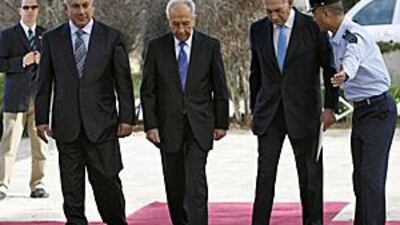RAMALLAH, WEST BANK // Benjamin Netanyahu, the new Israeli prime minister, was officially sworn in yesterday at the residence of Shimon Peres, the Israeli president, and the work, in his words, is about to begin. But what work, exactly? Mr Netanyahu, before being sworn in, spoke of Israel's new government striving to make peace with the Palestinians. "I am telling the leaders of the Palestinian Authority, if you really want peace, it is possible to reach peace," he said. "We do not want to govern another people. We do not want to exercise our power over the Palestinians."
But he did not commit his government to pursuing a two-state solution and has yet to declare that he will work towards the establishment of a sovereign Palestinian state alongside Israel. So although Mr Netanyahu spoke of the many tasks facing his government, the biggest in Israel's history, on the Palestinian side there is fear that the new Israeli government will only roll its sleeves up to end hopes of a negotiated two-state solution and expand its illegal settlements in occupied territory.
"This is a government of war, not a government of peace," said Hatem Abdel Qader, a Fatah official and adviser to Salam Fayyad, the Palestinian caretaker prime minister. "I think it will be very difficult to continue the peace process with this government as long as it doesn't accept the two-state solution." Mahmoud Abbas, the Palestinian president, said Mr Netanyahu "does not believe in peace". In an interview published yesterday he urged the international community to apply pressure on the new Israeli leader.
"Benjamin Netanyahu never believed in a two-state solution or accepted signed agreements and does not want to stop settlement activity. This is obvious," Mr Abbas said. "Let's put the ball in the world's court so that it puts pressure on him and assumes its responsibilities." As if to underscore such concerns, practically the first words that came out of Avigdor Lieberman, the new Israeli foreign minister and leader of the far-right Yisrael Beiteinu Party, after he was sworn in, was to announce that Israel was not bound to the Annapolis agreement, reached between the Palestinian Authority and the previous Israeli government in the United States in 2007.
"The Annapolis conference has no validity," Mr Lieberman said at a ceremony at the Israeli foreign ministry yesterday. At Annapolis, each side agreed to further discussions aimed at creating an independent Palestinian state. "There is one document that obligates us - and that's not the Annapolis conference," Mr Lieberman said. That obligatory document is the 2003 Quartet-sponsored road map plan for peace.
The lack of a clear Israeli commitment to a two-state solution and the prominent presence in government of someone like Mr Lieberman, who has previously advocated bombing the Aswan Dam in Egypt and said he desires to rid Israel of its non-Jewish citizens, particularly its Palestinians, has caused several Palestinian officials to warn that negotiations with Israel may come to a halt. In an interview last month, Saeb Erekat, the top Palestinian negotiator, said: "If an Israeli government is formed and it doesn't accept a two-state solution, it will not be our partner and we won't negotiate with it."
That also was the opinion of Mr Abdel Qader, who described the moment as "critical". "Without accepting a two-state solution and ending settlement building there will be no negotiations between the PA and Israel." The view from the Gaza Strip was equally downcast. The continued presence of Ehud Barak, the Labor leader, as defence minister may indicate that Israeli policy on Gaza and Hamas, including efforts to secure a lasting ceasefire, will continue, but Ghazi Hamad, a Hamas official, said he saw little chance now of a ceasefire agreement or prisoner exchange deal being reached.
"Netanyahu wants to show that he is different and that he can do more than his predecessors. I don't think he will accept a ceasefire agreement because throughout his campaign he called for continued aggression on Gaza and a tighter siege. I don't expect this will be a time of calm." With Palestinian unity talks due to resume in Cairo, the Netanyahu government has, however, provided a rallying point around which estranged Palestinian factions could unite. Both Mr Abdel Qader and Mr Hamad said they hoped Palestinian unity might now be reached in the face of the new government, while the Fatah official also said Palestinians could go back to the "option of resistance", echoing the rhetoric of Hamas.
In all events, the role of the international community is going to be crucial in the coming weeks, as the new government settles in and the Palestinian side settles on a response, unified or otherwise. Hussein Zahour, 24, one of the customers at Baladna, a popular coffee and shisha shop in the centre of Ramallah, was the only person yesterday to have a positive thing to say about the new Israeli government. "Ever since [former Israeli prime minister Yitzak] Rabin was killed for trying to make peace, all Israeli governments have been the same," said the young advertising executive in between puffs of his water pipe. "They all pursued the tactic of 'kill to win'.
"Netanyahu and Lieberman are just more honest about it." okarmi@thenational.ae

